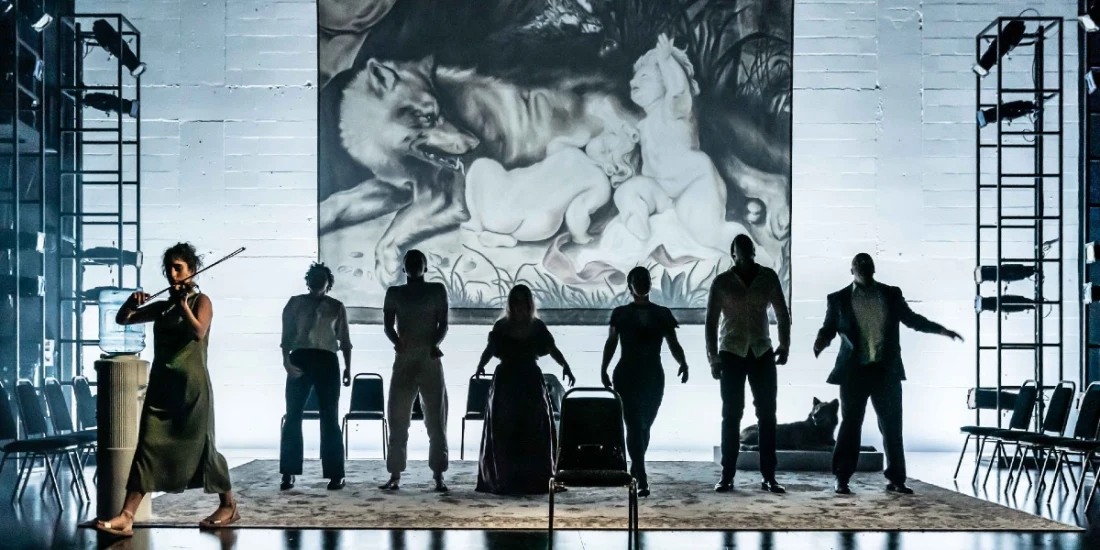'Britannicus' review — classical drama brings fresh energy and adventure
French neoclassical drama sits alongside English Restoration comedy as perhaps the two Western theatrical genres least frequently revived these days, for the simple reason that they require two very particular (if different) skill sets. I last saw Jean Racine’s 1669 play Britannicus in a fine revival from Jonathan Kent in 1998 that starred Toby Stephens and the late Diana Rigg and was played alongside the same writer’s best-known play, Phèdre.
This current iteration boasts a robust version of the exacting original from Timberlake Wertenbaker (Three Birds Alighting on a Field) – here doubling as translator and adapter – that was first seen in London in 2011. Atri Banerjee’s modish take on a tricky text won’t be to all tastes, but those with an appetite for theatrical adventure, not to mention name-heavy exposition, will find their curiosity rewarded. And the evening proves among other things that Banerjee, a onetime press officer at the National Theatre, is a talent to watch.
As is often the case with this specific repertoire, the title character doesn’t necessarily get the most stage time. In Kent’s production, Stephens played Nero, who has been granted authority by his loving if tough-minded mother, Agrippina, at the expense of Nero’s half-brother, Britannicus, and a lineup of supporting characters that includes the tyrannical Claudius. The name puts Hamlet in mind as well as the incestuous passions that inform the play’s central dynamic.
Claudius’s fourth wife is – wait for it - also his niece. And she, Sirine Saba’s gleaming-eyed Agrippina, turns more than a platonic gaze toward the fevered Nero, played by a barefoot, white-clad William Robinson with a gathering intensity bordering on mania.
Within this anything-goes context, no wonder Hanna Khogali’s Albine anxiously wielding a violin starts off a staging given to repeated moments when language leaves off and the company surrenders to a collective spasm. The cast twitches and shakes as if taken over by some unknown force, courtesy of movement director Jennifer Jackson. You have to wonder after a while whether a nearby exorcist might prove useful.
The title role falls to burgeoning TV name Nathaniel Curtis (It’s A Sin), who cuts an imposing figure by dint of his sheer height and stylish long hair.
But however great Britannicus’s share of weighty questions (“Is love mute? Has it only one language?”), attention devolves towards the peevish, power-hungry Nero, whose future looks less than bright – at least as foreseen by his mum, who turns into a Cassandra figure before the 100 minutes (played without an interval) are up. As Junia, the youthful love interest of both men, Shyvonne Ahmmad lends a tearful gaze to the gathering turmoil.
Rosanna Vize’s design, artfully lit by Lee Curran, makes ample use of key props, not least a water cooler that allows the actors to replenish parched throats lest the rhetoric get too much. Chairs are reconfigured to suit the power plays on view, and balloons appear around the time that the Rubens canvas visible towards the rear of the stage disappears, to be replaced by Nero’s name scrawled across the gallery-like wall.
It’s possible to read the play as a referendum on the limitations of candour: is too much honesty always helpful? (There’s even a character – Helena Lymbery’s Burrhus – marked out by an abhorrence of deceit.) More immediate resonances exist in the play’s portrait of tyrannical power grabs that feel all too current, albeit communicated in true Racinian form: events occur speedily, rather than the continually unfolding calamities that seem to be our contemporary lot.
The acting, for the most part, tends towards varying degrees of posturing in keeping with the attitudes struck by the characters at any given time: I missed the giddy thrum of internalised passion that gave my previous acquaintanceship with this play such a kick. The cast tends to find a particular note and play it – a dry sarcasm for Lymbery, for instance, or the cool crispness of Saba, whose Agrippina is the play’s resident fashionista until such point as she, too, goes snap.
But those up for the ride will be intrigued throughout, and the copious use of that water cooler should do wonders for bar sales throughout the run.
Britannicus is at the Lyric Hammersmith to June 25.
Photo credit: Hanna Khogali, Helena Lymbery, William Robinson, Shyvonne Ahmmad, Sirine Saba, Nathaniel Curtis, and Nigel Barrett in Britannicus. (Photo by Marc Brenner)
Originally published on
